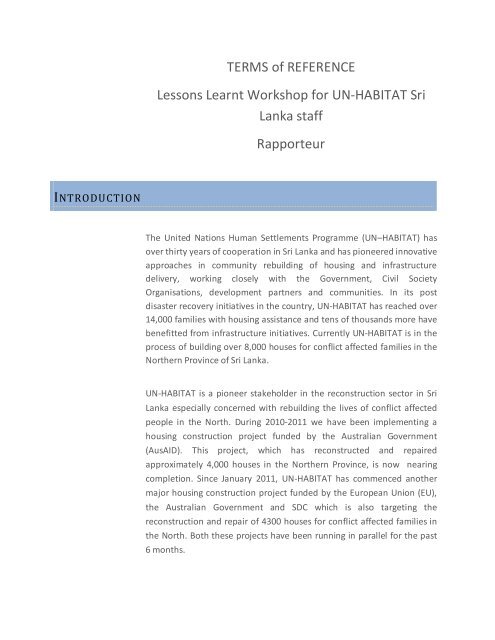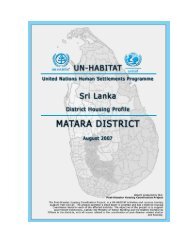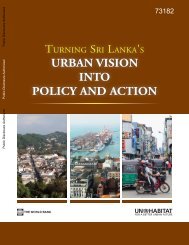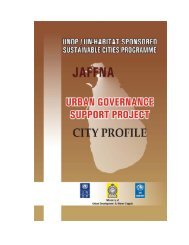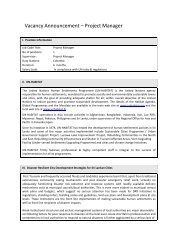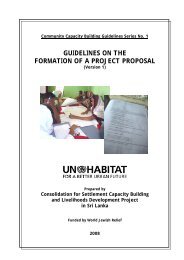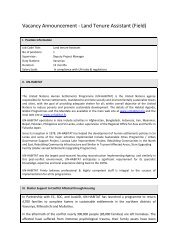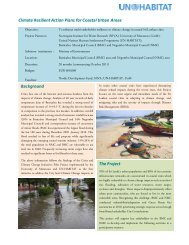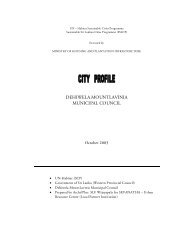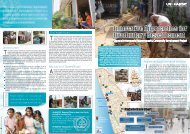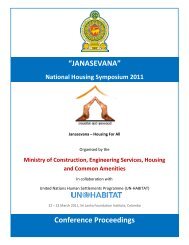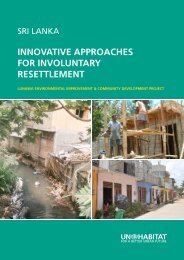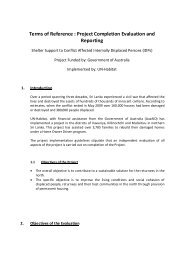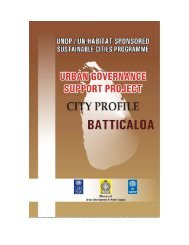TERMS of REFERENCE Lessons Learnt Workshop for UN-HABITAT ...
TERMS of REFERENCE Lessons Learnt Workshop for UN-HABITAT ...
TERMS of REFERENCE Lessons Learnt Workshop for UN-HABITAT ...
You also want an ePaper? Increase the reach of your titles
YUMPU automatically turns print PDFs into web optimized ePapers that Google loves.
<strong>TERMS</strong> <strong>of</strong> <strong>REFERENCE</strong><br />
<strong>Lessons</strong> <strong>Learnt</strong> <strong>Workshop</strong> <strong>for</strong> <strong>UN</strong>‐<strong>HABITAT</strong> Sri<br />
Lanka staff<br />
Rapporteur<br />
INTRODUCTION<br />
The United Nations Human Settlements Programme (<strong>UN</strong>–<strong>HABITAT</strong>) has<br />
over thirty years <strong>of</strong> cooperation in Sri Lanka and has pioneered innovative<br />
approaches in community rebuilding <strong>of</strong> housing and infrastructure<br />
delivery, working closely with the Government, Civil Society<br />
Organisations, development partners and communities. In its post<br />
disaster recovery initiatives in the country, <strong>UN</strong>‐<strong>HABITAT</strong> has reached over<br />
14,000 families with housing assistance and tens <strong>of</strong> thousands more have<br />
benefitted from infrastructure initiatives. Currently <strong>UN</strong>‐<strong>HABITAT</strong> is in the<br />
process <strong>of</strong> building over 8,000 houses <strong>for</strong> conflict affected families in the<br />
Northern Province <strong>of</strong> Sri Lanka.<br />
<strong>UN</strong>‐<strong>HABITAT</strong> is a pioneer stakeholder in the reconstruction sector in Sri<br />
Lanka especially concerned with rebuilding the lives <strong>of</strong> conflict affected<br />
people in the North. During 2010‐2011 we have been implementing a<br />
housing construction project funded by the Australian Government<br />
(AusAID). This project, which has reconstructed and repaired<br />
approximately 4,000 houses in the Northern Province, is now nearing<br />
completion. Since January 2011, <strong>UN</strong>‐<strong>HABITAT</strong> has commenced another<br />
major housing construction project funded by the European Union (EU),<br />
the Australian Government and SDC which is also targeting the<br />
reconstruction and repair <strong>of</strong> 4300 houses <strong>for</strong> conflict affected families in<br />
the North. Both these projects have been running in parallel <strong>for</strong> the past<br />
6 months.
The framework given to complete the project along with the external<br />
environment, has caused strain to the work and added pressure on staff<br />
in completing the project on time.<br />
As one <strong>of</strong> the first <strong>UN</strong> agencies to assist IDPs in the North on permanent<br />
housing following the end <strong>of</strong> war, numerous lessons have been learnt by<br />
<strong>UN</strong>‐<strong>HABITAT</strong> staff during the implementation <strong>of</strong> the AusAID project.<br />
These good practices and lessons learnt stemming from the AusAID<br />
project could be utilized in the new housing project, which is currently<br />
being implemented, to achieve effective results. Hence, facilitation is<br />
needed to revisit the strategies that have been adapted <strong>for</strong> the AusAID<br />
project. These strategies could be changed and applied in the EU funded<br />
project wherever necessary. Also the achievements and good practices <strong>of</strong><br />
the AusAID project can be replicated in the EU project by putting in place<br />
relevant techniques and strategies. By doing so, the staff could resolve<br />
bottlenecks that may arise in the EU project in a timely and efficient<br />
manner.<br />
A rapporteur is needed to document the workshop and produce a report<br />
as a material which could be used as a reference <strong>for</strong> future projects and<br />
<strong>for</strong> internal and external stakeholders alike.<br />
ROLE OF RAPPORTEUR<br />
‐ Understand the objectives <strong>of</strong> the workshop and prepare indicators to<br />
measure success<br />
‐ Attend all sessions <strong>of</strong> the workshop. ‘Minute’ discussions and collect and<br />
summarise any <strong>of</strong> the participants written work (group work on flip<br />
charts etc)<br />
‐ Draw out and document important lessons and all best practices<br />
‐ Document important discussions, views, theories relevant to the<br />
organizations knowledge base.<br />
‐ Comment on the impact and outcomes <strong>of</strong> the workshop, on personnel<br />
and on project design, planning and implementation.
‐ The final report should be a high quality document which will be<br />
circulated globally within <strong>HABITAT</strong> and will be shared with other agencies<br />
‐ The rapporteur should deliver the draft report within 2 weeks <strong>of</strong> the<br />
closure <strong>of</strong> the workshop and deliver a final report one week after<br />
receiving final comments on the draft from <strong>UN</strong>‐<strong>HABITAT</strong><br />
PAYMENT SCHEDULE<br />
Food and accommodation during the programme will be provided by <strong>UN</strong>‐<br />
<strong>HABITAT</strong><br />
Payment: full amount upon completion <strong>of</strong> the assignment.


